
Julien Barber (right) leading a panel discussion on the importance of youth engagement in sustainability and climate change with fellow YFEL members at the World Future Energy Summit
The PSFC graduate student reflects on the Young Future Energy Leaders Program
January 22, 2018
Tell us about the Young Future Energy Leaders Program you participated in?
The Young Future Energy Leaders (YFEL) is a prestigious program under the patronage of His Highness General Sheikh Mohamed Bin Zayed Al Nahayan, Crown Prince of Abu Dhabi, targeting the elite bright young people — from students and young professionals - to inspire, engage and empower them to be tomorrow’s leaders in the field of alternative energy and sustainability.
It is a year-long program that starts during Abu Dhabi Sustainability Week and ends at the same event the year after. Specifically, the program takes part in the World Future Energy Summit. This event provides the YFEL members with a platform to discuss issues, ideas and solutions through scheduled debates, lectures and presentations with today’s decision makers, global influencers, officials, and executives in this dynamic and vitally important field.
What stood out most for you about the Program?
One of the stand out aspects of the World Future Energy Summit was the high priority placed on engaging youth in the climate problem. This was a central theme to the entire summit, with unique opportunities and emphasis given to the members of the YFEL community. When it comes to climate change, we often jump right to technological, political, or business solutions as the remedy. As much as these solutions are critical, it is the younger generation that will be filling the leadership roles in the coming years. Therefore, it is vitally important to engage, educate, and involve youth in these sustainable solutions today in order to develop young people as an integral part of solutions in the future.
The second stand out aspect was the incredible priority other nations are putting on sustainably developing a clean and robust energy infrastructure. Often times it feels like an uphill battle pursuing this field, but there is a lot of support internationally for clean energy which is nice to have reinforced.
What have you learned by participating in the program about energy leadership? Why do you feel this is important for MIT students interested in energy?
I think one of the key points I drew from the YFEL program was the absolute importance in engaging individuals from all walks of life in sustainability. As a leader, it is your responsibility to engage and inspire action in others. The organizers of the summit appropriately selected the “butterfly effect” as the summit’s theme. In essence, the butterfly effect relates to a concept in chaos theory outlining the sensitive dependence of initial conditions to a later state of the system. It boils down to the common saying: small actions can make a big difference - which is entirely true when it comes to sustainability.
For MIT students, the concept of small actions is especially relevant. We are all fortunate enough to be at the leading edge of our fields. How we interact with our environment, and how we choose to pursue our research, careers, and professional development matters to the overall health of our planet. Recycling, turning off the lights when you aren’t at home, biking to school — these are all small actions, but identify a greater meaning. Placing importance on these small actions each day helps to reinforce our desire to live sustainably, and developing a sustainable mindset now trickles far deeper than the impact of a single bike ride or a recycled bottle. By developing these habits early on, we set the tone for how we will one day run our business, develop our political views, or conduct our research. Moreover, we each of us inspire one another. Therefore, our small actions connect us to everyone around us, multiplying the potential to impact the decisions of the next major CEO, inspire the design of the next new renewable technology, or help to develop the nation’s future energy policy. We will be the ones stepping into roles of influence in the coming years, and these small actions add up to make substantial impact in our future.
How will you apply what you have learned as you go forward with your career in renewable and sustainable energy?
As I think forward in my own career, the concept of small actions helps to guide a strong vision for leadership. However, it also reinforces for me that there is no one answer to climate change. It is a collection of small solutions, all designed to tackle a portion of a larger problem. For society to successfully navigate the challenges associate with climate change, we require solutions from civic engagement to renewable generation; from policy action to business innovation. Engineering, physics, economics, business, policy – none of these disciplines can solve climate change on their own. Long-lasting ecologically sustainable change requires multiple solutions, each of which spans across various disciplines. I believe this to be a critical aspect for young leaders to understand in the coming years as we try to develop the many solutions required to address our warming climate.
Topics: Joseph Minervini